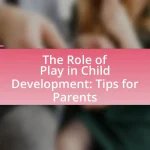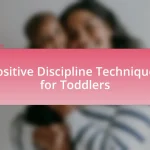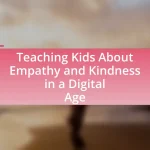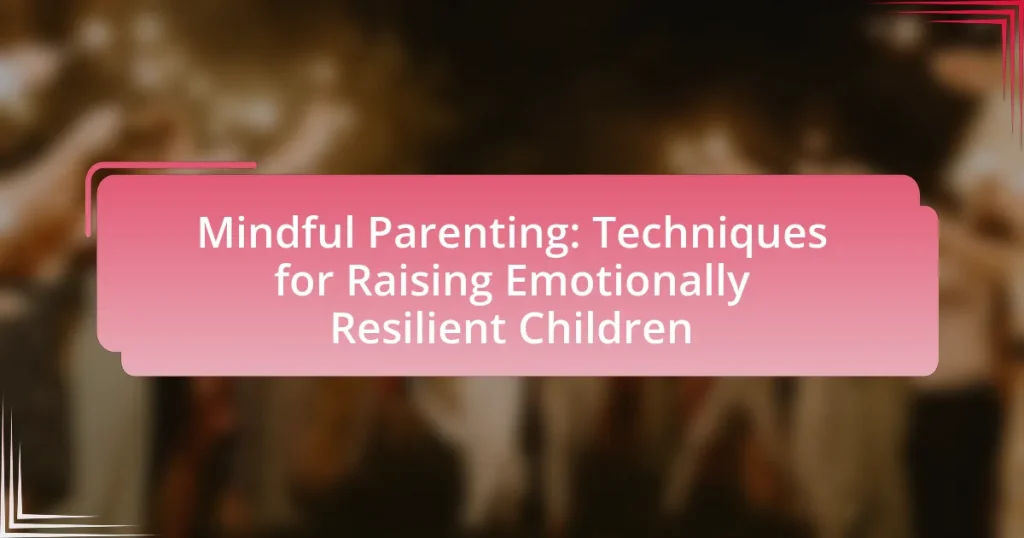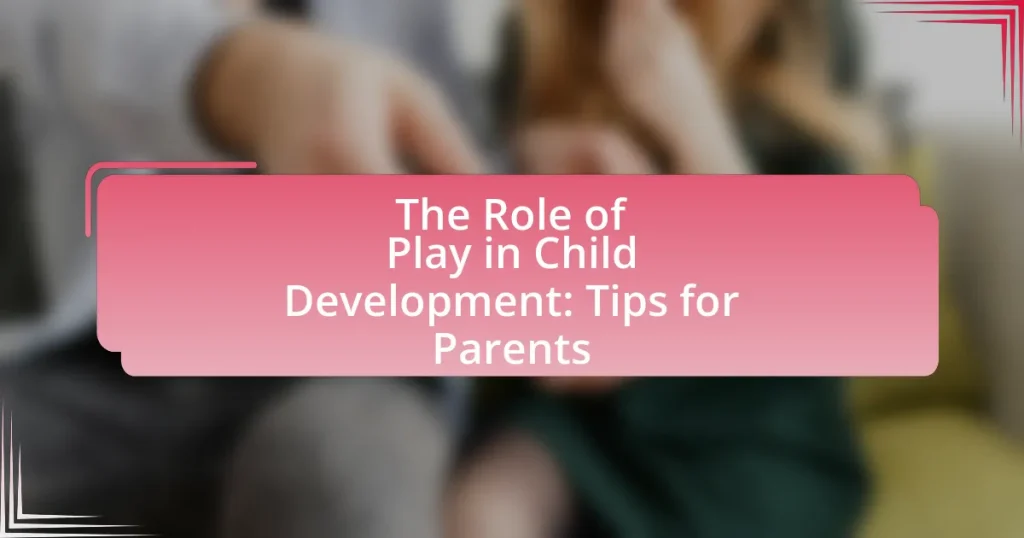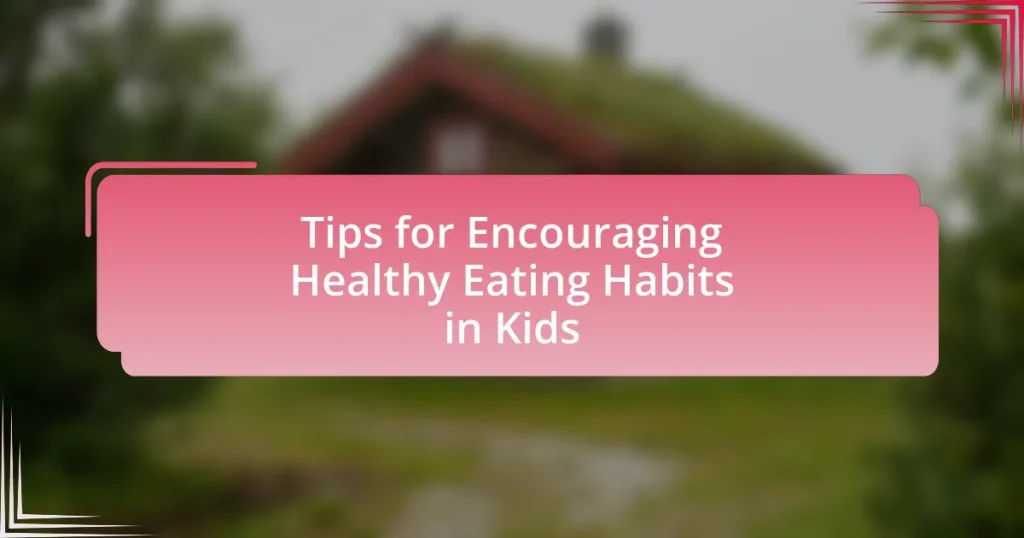Mindful parenting is an approach that emphasizes present-moment awareness and emotional regulation in parenting, fostering deeper connections between parents and children. This article explores the principles of mindful parenting, including techniques such as active listening and non-judgmental awareness, which enhance emotional resilience in children. It discusses the differences between mindful and traditional parenting, the importance of emotional resilience for children’s development, and practical steps for parents to incorporate mindfulness into their daily interactions. Additionally, the article addresses common challenges parents face in practicing mindfulness and provides resources for further learning.
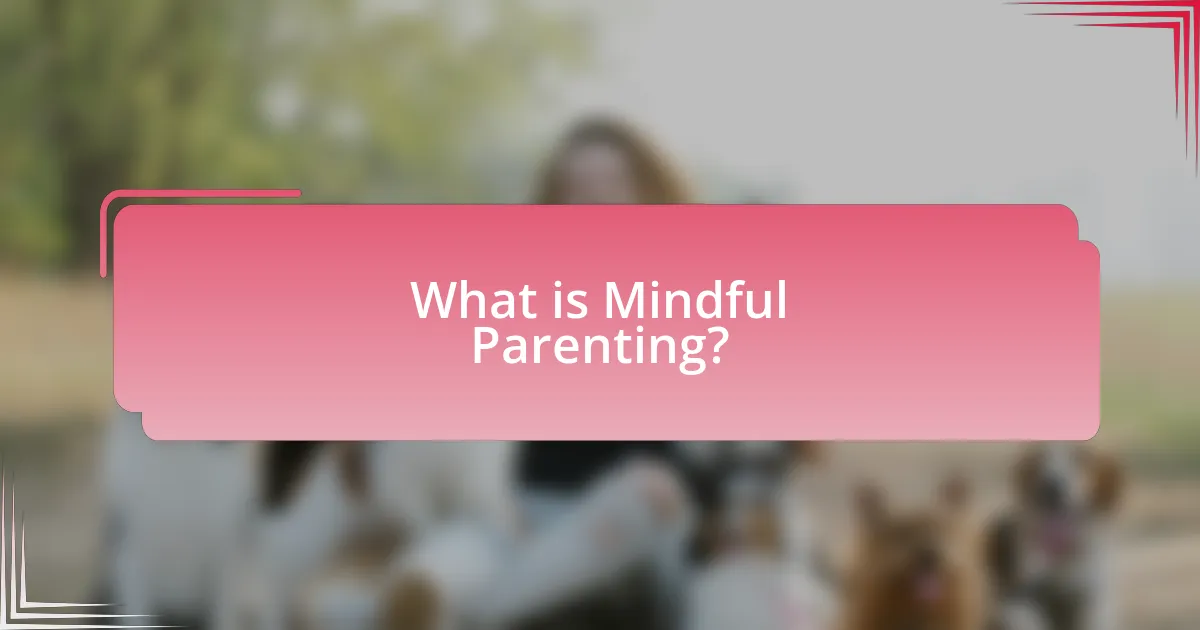
What is Mindful Parenting?
Mindful parenting is an approach that emphasizes being present and fully engaged with one’s children while fostering emotional awareness and responsiveness. This practice encourages parents to observe their thoughts and feelings without judgment, allowing them to respond to their children’s needs with greater empathy and understanding. Research indicates that mindful parenting can lead to improved parent-child relationships and enhanced emotional regulation in children, as evidenced by studies showing that parents who practice mindfulness report lower levels of stress and higher levels of satisfaction in their parenting roles.
How does Mindful Parenting differ from traditional parenting approaches?
Mindful Parenting differs from traditional parenting approaches primarily in its emphasis on present-moment awareness and emotional regulation. While traditional parenting often focuses on discipline and behavioral correction, Mindful Parenting encourages parents to be fully present with their children, fostering a deeper emotional connection and understanding. Research indicates that this approach can lead to improved emotional resilience in children, as parents who practice mindfulness are more likely to respond thoughtfully rather than reactively to their children’s needs, promoting a supportive environment that enhances emotional development.
What are the key principles of Mindful Parenting?
The key principles of Mindful Parenting include being present, non-judgmental awareness, and emotional regulation. Being present involves fully engaging with children in the moment, which fosters deeper connections and understanding. Non-judgmental awareness encourages parents to observe their thoughts and feelings without criticism, allowing for more thoughtful responses to parenting challenges. Emotional regulation helps parents manage their own emotions, creating a calmer environment for children. Research indicates that these principles contribute to the development of emotional resilience in children, as they learn to navigate their own feelings and relationships effectively.
How does mindfulness influence parenting styles?
Mindfulness significantly influences parenting styles by promoting greater emotional awareness and responsiveness in parents. When parents practice mindfulness, they become more attuned to their own emotions and those of their children, leading to more empathetic and supportive interactions. Research indicates that mindful parenting is associated with lower levels of parental stress and increased emotional regulation, which in turn fosters a nurturing environment for children. A study published in the Journal of Child and Family Studies found that parents who engaged in mindfulness practices reported higher levels of positive parenting behaviors and lower levels of harsh discipline, demonstrating the direct impact of mindfulness on parenting styles.
Why is Mindful Parenting important for emotional resilience?
Mindful parenting is important for emotional resilience because it fosters a supportive environment that enhances children’s ability to cope with stress and adversity. By practicing mindfulness, parents model emotional regulation and awareness, which children can internalize and replicate in their own lives. Research indicates that children raised in mindful environments exhibit greater emotional intelligence and resilience, as they learn to navigate their feelings and reactions effectively. A study published in the Journal of Child and Family Studies found that mindful parenting practices significantly correlate with improved emotional regulation in children, demonstrating the direct impact of parental mindfulness on a child’s emotional resilience.
What is emotional resilience and why does it matter?
Emotional resilience is the ability to adapt to stress, adversity, and challenges while maintaining mental well-being. This capacity is crucial because it enables individuals, particularly children, to cope with difficulties, recover from setbacks, and develop a positive outlook on life. Research indicates that emotionally resilient children are more likely to succeed academically, maintain healthy relationships, and exhibit better mental health outcomes. For instance, a study published in the Journal of Child Psychology and Psychiatry found that resilience is linked to lower levels of anxiety and depression in children, highlighting its importance in fostering overall emotional health.
How can Mindful Parenting foster emotional resilience in children?
Mindful parenting fosters emotional resilience in children by promoting awareness and emotional regulation. This approach encourages parents to be present and attentive, allowing children to express their feelings in a safe environment. Research indicates that children who experience consistent emotional support from mindful parents develop better coping strategies and higher emotional intelligence. A study published in the Journal of Child Psychology and Psychiatry found that children whose parents practiced mindfulness exhibited lower levels of anxiety and improved emotional regulation skills. This evidence supports the notion that mindful parenting directly contributes to the development of emotional resilience in children.
What techniques are used in Mindful Parenting?
Mindful parenting techniques include active listening, emotional regulation, and non-judgmental awareness. Active listening involves fully engaging with a child’s words and emotions, fostering a deeper connection and understanding. Emotional regulation allows parents to manage their own reactions, creating a calm environment that promotes healthy emotional development in children. Non-judgmental awareness encourages parents to observe their thoughts and feelings without criticism, which helps in modeling acceptance and resilience for their children. These techniques are supported by research indicating that mindful parenting can enhance parent-child relationships and improve children’s emotional well-being.
How can parents practice mindfulness in daily interactions?
Parents can practice mindfulness in daily interactions by being fully present and attentive during conversations with their children. This involves actively listening without distractions, maintaining eye contact, and responding thoughtfully to their child’s needs and emotions. Research indicates that such mindful engagement fosters emotional resilience in children, as it helps them feel valued and understood, which is crucial for their development. For instance, a study published in the journal “Child Development” found that children whose parents practiced mindfulness exhibited better emotional regulation and social skills.
What role does active listening play in Mindful Parenting?
Active listening is crucial in Mindful Parenting as it fosters deeper emotional connections between parents and children. By fully engaging in conversations, parents validate their children’s feelings and experiences, which enhances emotional security and resilience. Research indicates that children who feel heard are more likely to develop strong emotional regulation skills, leading to better coping mechanisms in challenging situations. This connection is supported by studies showing that effective communication, including active listening, significantly contributes to a child’s emotional development and overall well-being.
How can parents implement Mindful Parenting techniques?
Parents can implement Mindful Parenting techniques by practicing present-moment awareness during interactions with their children. This involves actively listening to their child’s thoughts and feelings without judgment, which fosters emotional connection and understanding. Research indicates that parents who engage in mindfulness practices, such as meditation or deep breathing, can reduce stress and improve their emotional regulation, leading to more positive parenting outcomes. For instance, a study published in the Journal of Child and Family Studies found that mindful parenting is associated with lower levels of parental stress and higher levels of child emotional regulation. By incorporating these techniques, parents can create a nurturing environment that supports their child’s emotional resilience.
What are some practical steps for incorporating mindfulness into parenting?
To incorporate mindfulness into parenting, parents can practice being present during interactions with their children. This involves actively listening to their child’s thoughts and feelings without distractions, which fosters emotional connection and understanding. Research indicates that mindful parenting can enhance parent-child relationships and improve children’s emotional regulation (Duncan et al., 2009, Journal of Child and Family Studies). Additionally, parents can establish a daily mindfulness routine, such as meditation or deep-breathing exercises, to model calmness and emotional awareness for their children. Engaging in mindful activities together, like nature walks or cooking, can also promote shared experiences that enhance mindfulness in the family dynamic.
How can parents create a mindful environment at home?
Parents can create a mindful environment at home by incorporating regular mindfulness practices into daily routines. This can include setting aside time for family meditation, encouraging open discussions about feelings, and modeling mindful behaviors such as active listening and being present during interactions. Research indicates that environments fostering mindfulness can enhance emotional regulation and resilience in children, as demonstrated in studies like “Mindfulness in Schools: A Systematic Review and Meta-Analysis” by Zenner, Herrnleben-Kurz, and Walach, which found that mindfulness practices significantly improve emotional well-being in youth.
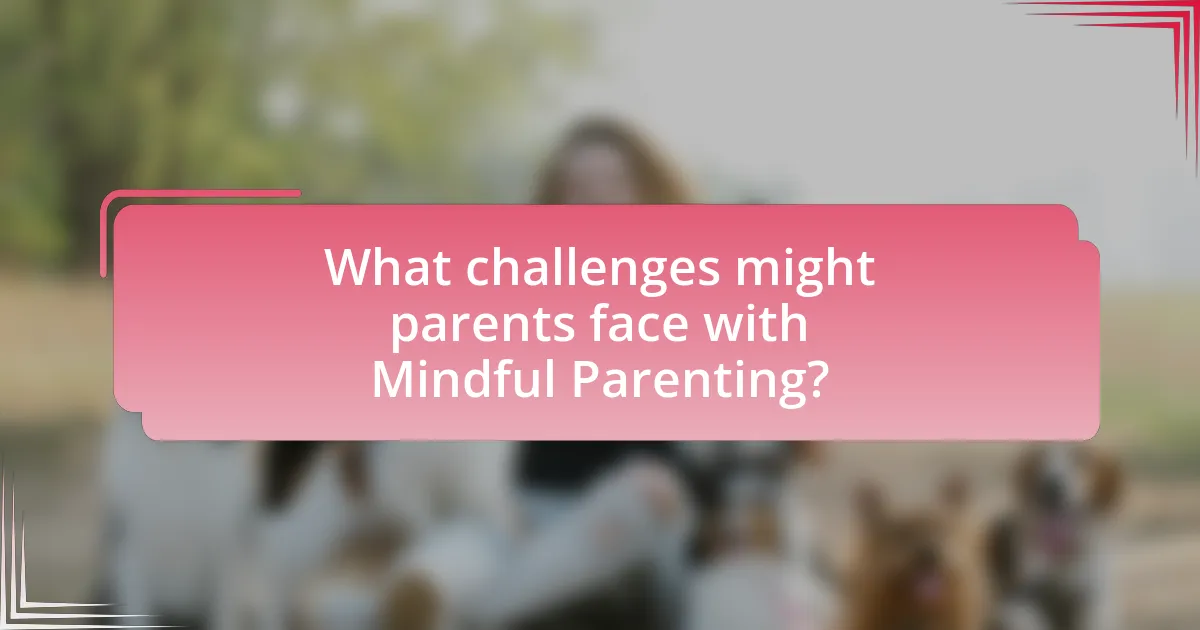
What challenges might parents face with Mindful Parenting?
Parents may face several challenges with Mindful Parenting, including difficulty in maintaining consistent mindfulness practices, managing their own emotional responses, and balancing mindfulness with daily responsibilities. Consistency can be hard to achieve due to the demands of parenting and external stressors, which may lead to lapses in mindfulness. Additionally, parents often struggle to regulate their emotions, making it challenging to model emotional resilience for their children. Research indicates that parents who experience high levels of stress may find it particularly difficult to engage in mindful practices, which can hinder their ability to foster a calm and supportive environment for their children.
How can parents overcome obstacles to practicing mindfulness?
Parents can overcome obstacles to practicing mindfulness by establishing a consistent routine that incorporates mindfulness activities into daily life. This can include setting aside specific times for mindfulness exercises, such as meditation or deep breathing, which helps create a habit and reduces the likelihood of distractions. Research indicates that regular practice can enhance emotional regulation and reduce stress, making it easier for parents to engage in mindfulness despite their busy schedules. Additionally, parents can seek support from mindfulness communities or online resources, which provide guidance and accountability, further facilitating their mindfulness journey.
What common misconceptions about Mindful Parenting exist?
Common misconceptions about Mindful Parenting include the belief that it requires perfection in parenting or that it is solely about being calm and relaxed. Many people think that Mindful Parenting means parents must always respond to their children with complete composure, which is unrealistic. Research indicates that Mindful Parenting is more about being present and aware of one’s thoughts and feelings, allowing for authentic responses rather than perfect ones. Additionally, some believe that Mindful Parenting is a rigid set of rules, when in fact, it encourages flexibility and adaptability in parenting styles, promoting emotional resilience in children through genuine connection and understanding.
How can parents manage stress while practicing Mindful Parenting?
Parents can manage stress while practicing Mindful Parenting by incorporating regular mindfulness techniques such as deep breathing, meditation, and self-reflection into their daily routines. These practices help parents remain present and calm, reducing anxiety and enhancing emotional regulation. Research indicates that mindfulness can lower stress levels; for instance, a study published in the journal “Psychological Science” found that mindfulness training significantly reduced stress and improved emotional well-being among participants. By prioritizing their mental health through these techniques, parents can create a more supportive environment for their children, fostering resilience and emotional stability.
What resources are available for parents interested in Mindful Parenting?
Parents interested in Mindful Parenting can access a variety of resources, including books, online courses, workshops, and mobile applications. Notable books such as “The Whole-Brain Child” by Daniel J. Siegel and Tina Payne Bryson provide insights into integrating mindfulness into parenting. Online platforms like Mindful Schools offer structured courses that teach mindfulness techniques specifically for parents. Additionally, workshops led by certified mindfulness instructors can provide hands-on experience and community support. Mobile applications like Headspace and Calm also feature sections dedicated to mindfulness practices that parents can incorporate into their daily routines. These resources collectively support parents in fostering emotional resilience in their children through mindful practices.
What books or courses can help parents learn more about Mindful Parenting?
Books such as “The Whole-Brain Child” by Daniel J. Siegel and Tina Payne Bryson, and “Mindful Parenting” by Kristen Race provide valuable insights into mindful parenting techniques. These books emphasize the importance of emotional awareness and connection in raising resilient children. Additionally, online courses like “Mindful Parenting: A Course for Parents” offered by the Greater Good Science Center at UC Berkeley teach practical strategies for integrating mindfulness into parenting practices. Research indicates that mindful parenting can enhance parent-child relationships and improve children’s emotional regulation, supporting the effectiveness of these resources.
How can support groups enhance the practice of Mindful Parenting?
Support groups can enhance the practice of Mindful Parenting by providing a platform for sharing experiences, strategies, and emotional support among parents. These groups foster a sense of community, which can reduce feelings of isolation and stress, allowing parents to practice mindfulness more effectively. Research indicates that social support is linked to improved mental health outcomes, which can directly influence parenting practices. For instance, a study published in the Journal of Family Psychology found that parents who participated in support groups reported higher levels of emotional regulation and mindfulness, leading to more positive interactions with their children. This evidence underscores the role of support groups in promoting the principles of Mindful Parenting, ultimately contributing to the emotional resilience of children.
How can Mindful Parenting impact children’s development?
Mindful parenting significantly enhances children’s development by fostering emotional regulation and resilience. Research indicates that parents who practice mindfulness are more attuned to their children’s emotional needs, which leads to improved parent-child interactions. A study published in the Journal of Child and Family Studies found that mindful parenting correlates with lower levels of child behavioral problems and higher levels of emotional intelligence in children. This is because mindful parents model self-awareness and emotional regulation, equipping their children with essential skills for managing stress and building healthy relationships.
What are the long-term benefits of raising emotionally resilient children?
Raising emotionally resilient children leads to long-term benefits such as improved mental health, better academic performance, and enhanced social skills. Emotionally resilient children are more likely to cope effectively with stress and adversity, which reduces the risk of anxiety and depression in adulthood. Research indicates that these children often achieve higher levels of education and career success, as they possess the ability to navigate challenges and setbacks. Additionally, studies show that emotionally resilient individuals tend to have stronger relationships and better communication skills, contributing to a supportive social network throughout their lives.
How does emotional resilience affect academic performance?
Emotional resilience positively affects academic performance by enabling students to cope with stress and challenges more effectively. Resilient students are better equipped to manage academic pressures, leading to improved focus, motivation, and persistence in their studies. Research indicates that students with higher emotional resilience tend to achieve better grades and exhibit lower levels of anxiety and depression, which can hinder academic success. For instance, a study published in the Journal of Educational Psychology found that emotional resilience is significantly correlated with academic achievement, highlighting its role in fostering a supportive learning environment.
What social skills are enhanced through Mindful Parenting?
Mindful Parenting enhances several social skills, including empathy, emotional regulation, and effective communication. By practicing mindfulness, parents model attentive listening and emotional awareness, which fosters empathy in children. Research indicates that children raised in mindful environments demonstrate improved emotional regulation, allowing them to manage their feelings and reactions better. Additionally, effective communication skills are developed as parents engage in open dialogues, encouraging children to express themselves clearly and respectfully. These skills are crucial for building healthy relationships and navigating social interactions successfully.
What are some best practices for Mindful Parenting?
Best practices for mindful parenting include being present, practicing active listening, and modeling emotional regulation. Being present means fully engaging with your child during interactions, which fosters a strong emotional connection. Active listening involves giving your child your full attention, validating their feelings, and responding thoughtfully, which enhances their sense of security and self-worth. Modeling emotional regulation teaches children how to manage their emotions effectively, as they learn by observing their parents’ responses to stress and challenges. Research indicates that these practices contribute to the development of emotional resilience in children, as they provide a supportive environment that encourages healthy emotional expression and coping strategies.
How can parents model mindfulness for their children?
Parents can model mindfulness for their children by practicing present-moment awareness and demonstrating emotional regulation in daily situations. Engaging in activities such as mindful breathing, meditation, or simply being fully attentive during conversations shows children the importance of being present. Research indicates that children who observe their parents practicing mindfulness are more likely to adopt similar behaviors, enhancing their emotional resilience and coping skills. For instance, a study published in the Journal of Child and Family Studies found that parental mindfulness significantly correlates with children’s emotional regulation abilities, highlighting the effectiveness of modeling mindfulness in fostering emotional resilience.
What daily routines can reinforce Mindful Parenting techniques?
Daily routines that can reinforce Mindful Parenting techniques include setting aside specific times for family mindfulness practices, such as meditation or deep breathing exercises, which help parents and children connect and regulate emotions. Engaging in regular family discussions about feelings and experiences fosters open communication and emotional awareness, essential components of mindful parenting. Additionally, establishing consistent routines for meals and bedtime creates a sense of security and predictability, allowing children to feel safe and supported, which is crucial for emotional resilience. Research indicates that consistent routines can enhance children’s emotional regulation and overall well-being, making these practices effective in reinforcing mindful parenting techniques.
What tips can help parents succeed in Mindful Parenting?
To succeed in Mindful Parenting, parents should practice active listening, which involves fully focusing on their child’s words and emotions without distractions. This technique fosters a deeper connection and understanding, allowing parents to respond more effectively to their child’s needs. Research indicates that active listening enhances emotional intelligence in children, promoting resilience and better communication skills. Additionally, parents should incorporate regular mindfulness practices, such as meditation or deep-breathing exercises, into their daily routines. These practices help parents manage stress and model emotional regulation for their children, contributing to a calmer family environment.

